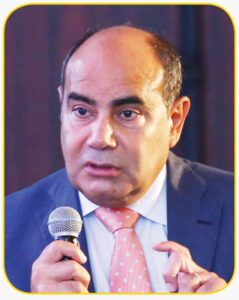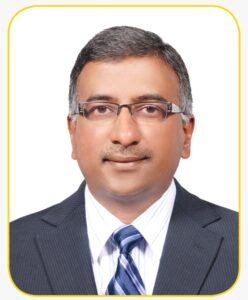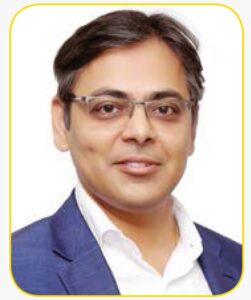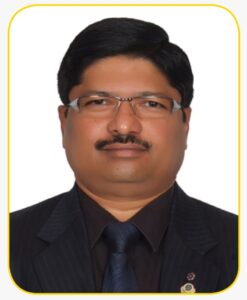The fourth edition of CPI Industry’s DC Dialogue trained the spotlight on the growing consolidation and commercial considerations shaping the market as well as the implications COVID-19 has had for the district cooling sector. Hannah Jo Uy shares key insights from a plenary discussion during the virtual conference…

George Berbari
MITIGATING THE DANGERS OF A GROWING MONOPOLY
George Berbari, CEO, DC PRO Engineering, kicked off the discussions by touching on the consolidation efforts happening within the district cooling industry, which have amounted to over AED 9.2 billion in the last six years alone. Commenting on this figure, Sekhar Reddy, Managing Director, Lexzander, said that he believes there will be only 2-3 district cooling operators in the near future in the UAE. “The market, overall, is looking for more customised and cost-effective solution-based plants,” he said. “Earlier, plants were taking a more futuristic approach. Now, the question is how to make the plants self sustained and deliver what is required to the end-user. That figure shows how plants changed hands, and there will be only a handful of people who can manage this plant.”
Berbari said such projections should urge the industry to reflect on whether the trend would be beneficial to the sector, or if a greater monopoly would reduce the negotiation power of end-users and put them at risk. Sagar Kulkarni, Managing Director, Consistent Engineering Consultants said that with the projected expansion in Dubai, which is expected to yield high occupancy, the model is feasible, though it puts financial pressure on the end-user, as minimum charges have to be made. “The bottom-line is that it is still more sustainable in terms of the environment, of society and the economy, but we have to find the best model, moving forward.”

Sekhar Reddy
Prabhakar Naik, Managing Director, Base VASTU and ENGG Services FZE, said that while from a country perspective consolidations would be good, moving towards a monopoly could serve as a bottleneck for greater adoption of district cooling, because the charges being levied are already quite high. Providing an example, Naik pointed to a project he was involved in, where despite a district cooling line being available, the building owner opted for a standalone system. “I designed my own standalone, water-cooled centrifugal chiller, because [district cooling] charges are higher and the benefits are not passed by the utility provider to the end-user,” he said.
For Dominic Mc Polin, Chief, Central Planning – Central Planning Office, Ministry of Works, Municipalities Affairs and Urban Planning, Bahrain, consolidation is a symptom of an immature market. “We are dealing with a new destination for financial investment,” he said. “It’s an attractive capture of customers locked in contracts. It’s attractive for finance of growing monopolies. This is a government issue, it’s about regulation, of how the industry is going to grow, and one of the issues is the danger of monopoly. Instead of this, there should be control over the transactions.”
Mc Polin said that this has prompted the public sector in Bahrain to actively look into connecting systems. “If we had regulation to allow companies to interconnect, we have a different type of model operating than a buy-and-sell consolidation model,” he said.

Sagar Kulkarni
As part of this exercise, Mc Polin said two main district cooling companies in Bahrain were asked to address technical issues related to interconnection of existing networks and found it to be feasible.
“The last part of the jigsaw puzzle is psychological, we are left with them having a commercial discussion,” he said. “This is behind the curtain, on the company’s structure of finance. But, physically, we want them to connect, and we want to make regulation.”
Mc Polin added that driving better regulations and promoting greater transparency in tariffs is the main focus of the Ministry. “If we had regulations on co-existence of different companies competing in the market with competitive terms, we wouldn’t have the last figure you had just shared,” he said, referring to the AED 9.2 billion worth of consolidation Berbari had shared. The importance of transparency of tariffs has been further underscored during COVID-19, Mc Polin said. “We gave a three- month tariff holiday across Bahrain, and that exposed the district cooling companies,” he said. “We certainly had transparency in the tariffs, because we suddenly had the electricity cost. Everyone was shocked at how much they were paying in their bill [for district cooling]. So, we are proposing [district cooling] should be looked on as a model with a regulatory scheme with an independent regulator that looks at tariffs, at transactions, and at buying and selling.”

Prabhakar Naik
Naik suggested that the slab tariff in Dubai ought to be reviewed in the context of district cooling in the emirate. “Because of slab tariff, it is 44 fils for kilowatt-hour,” he said. “If you go for a DX in a small flat, your tariff starts at 23 fils per kilowatt hour. The district cooling provider should apply for concession from DEWA, because DEWA benefited from reduced carbon footprint, infrastructure cost. I don’t think it is being passed on to the utility provider. That is why in Dubai, people are hesitant for district cooling compared to Abu Dhabi and Bahrain. The operating cost is quite high – almost 65 fils per tonne hour, while standalone is costing me less than 50 fils, so why it is costing so much I don’t know.” Naik added that for the utility provider, in the event they are serving multiple buildings, there is strong diversity. “So, there is benefit, but it is hidden and not passed on,” he said. Reddy also pointed out that chilled water is an essential service to provide a definitive requirement for comfort of the population. “I don’t know why they are putting even profit,” he said. “Why the profit? It has to come back to the end-user.”
For Mc Polin, regulations are key if District Cooling is ever to be part of the infrastructure family, along with electricity, water, drainage and sewage “What we see is exploitation of lack of regulation
by government and ending up with this monopolistic type of consolidation,” he said. “[In Bahrain], we want to see district cooling in the street, capable of being connected to any development.” For this vision to become a reality, Mc Polin said that any building where district cooling exists must be connected to the network and that the only way for this to happen is “to make a financial case exposing the type of mathematics of alternative cooling systems against the district cooling offer, in terms of charges”.
COMMERCIAL CONSIDERATIONS IN VIEW OF THE PANDEMIC

Dominic Mc Polin
Taking the cue from Mc Polin, Berbari said that in addition to regulations, the government could play a more proactive role in easing the situation for consultants, manufacturers and other relevant stakeholders to be able to sustain business activity.
Reddy weighed in to point out that there is still a lot of money locked up in the market, and while the government has taken a lot of proactive measures, there is further room for improvement. “We see huge gap between the thought process and actions [taken],” he said adding that this has an impact on the deliverables. “I think it’s time that the government has a good meeting with key operators of the plant and developers of the plant, the Tabreeds, Empowers,” he said. “There is a need to bring these people together and also the end user and have some sort of a forum to see how this particular overall concept of DCP is well understood and delivered. In terms of thought-process, we need to think 21st century in technology, but think in the 1990s, when government did step in, in terms of funding. The working system is different now, but we need some sort of resolution, purely in terms of cash flow.” Kulkarni seconded this by saying that the government also has an important role to impart confidence to the sector.
Reddy said the spirit of cooperation should extend to the industry throughout the GCC region and that there should be work towards a common understanding to keep things going. “Let’s accept the fact that the whole world is going through turbulence,” he said. “I’m pretty optimistic the UAE will come out well, because it is a safe haven. People will relocate [to the UAE], and when they come, there will be no issues for education, accommodations, etc.” Berbari said he believes that more people will look to Dubai as a second home because of the infrastructure. “We see Dubai growing as a land where people want to buy a second home and have them travel here; maybe that would save the real estate,” he said. “We will see a strong recovery mid-2021.”
Agreeing with him, Reddy said the postponement of EXPO 2020 could be advantageous for the UAE in this regard. “It gives us time to have a framework,” he said. “By the time the EXPO starts, it will pick up, and I am very much confident the place will show the weight of the world.”
Copyright © 2006-2025 - CPI Industry. All rights reserved.